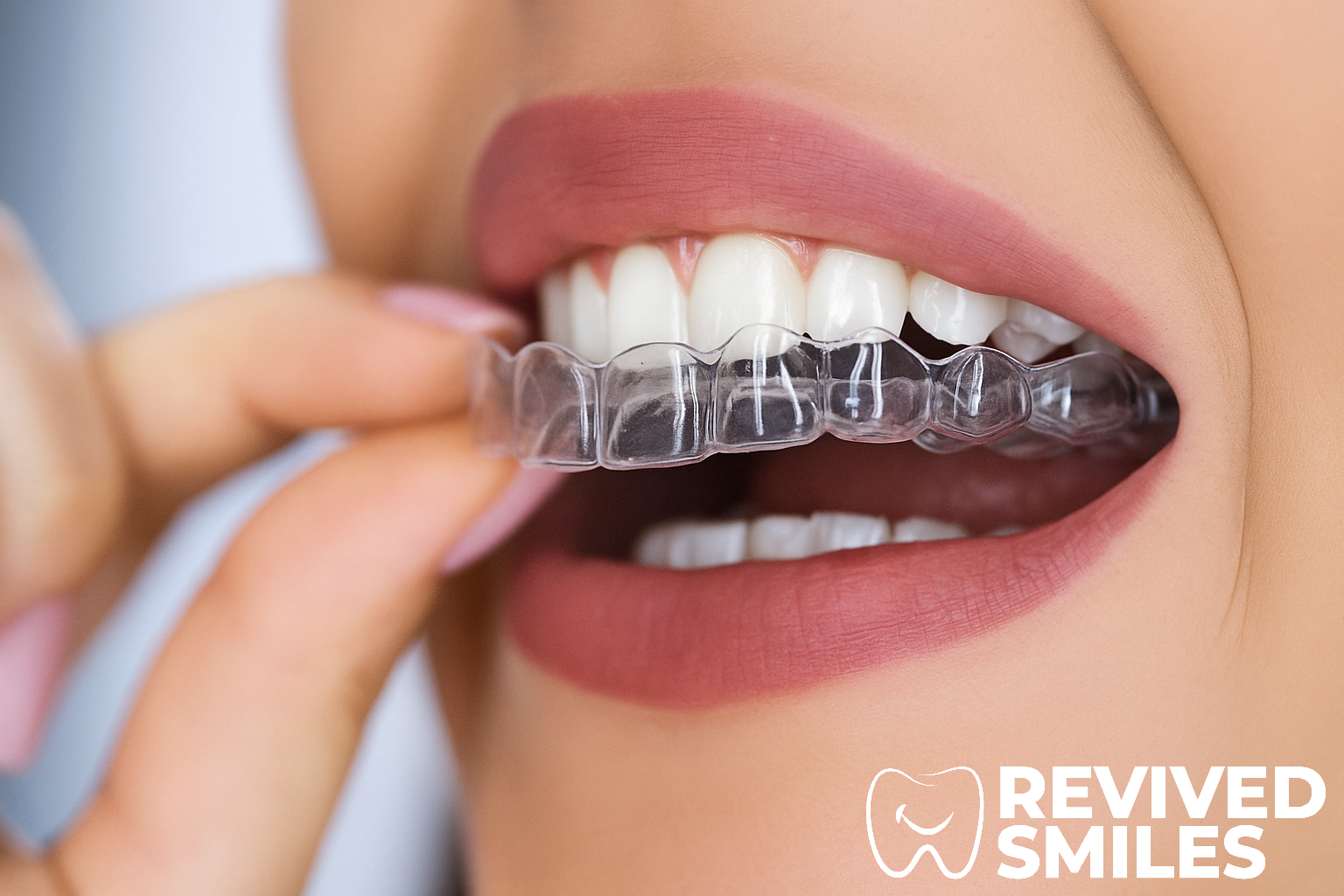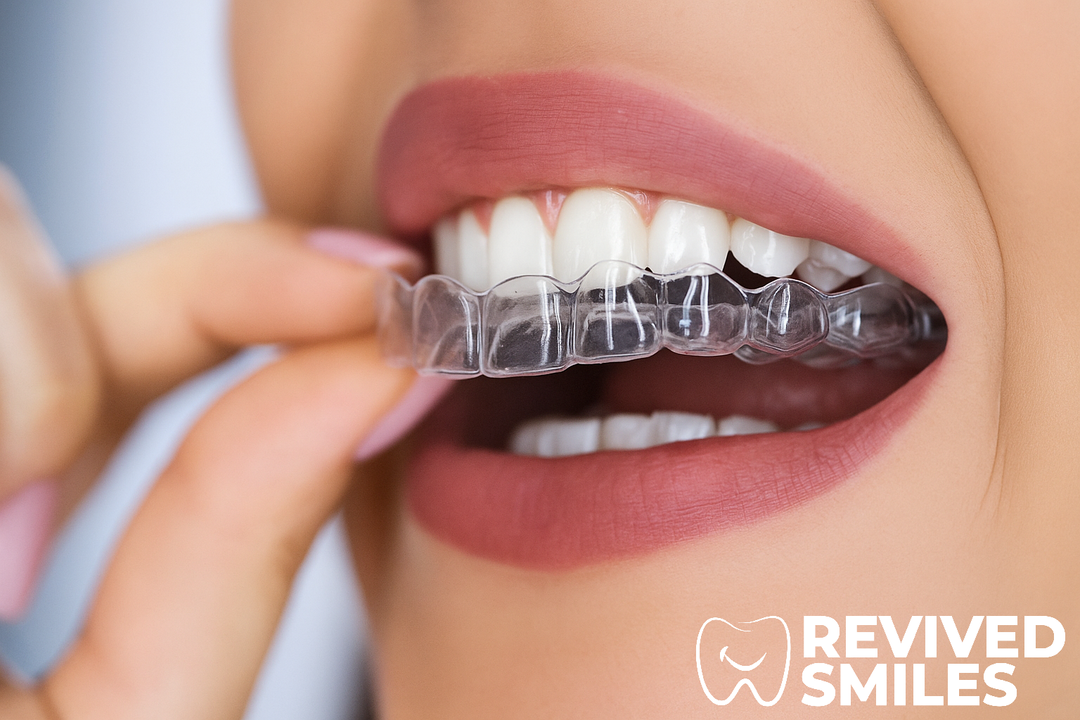What Is a Nightguard and How Does It Work?

Have you ever woken up with a sore jaw, tender teeth, or a dull headache that seems to appear out of nowhere? It might not be stress, or at least, not in the way you think. Some of the most common signs of bruxism include jaw pain, headaches, tooth sensitivity, and worn enamel.
Many people unknowingly grind their teeth or clench their teeth at night; in fact, you may grind your teeth while sleeping, a habit that can wear down enamel, strain jaw muscles, and cause other dental issues. That’s where a night guard comes in: a small, clear dental guard that quietly does big work while you sleep.
A night guard may seem simple, but it’s one of the most effective dental devices available for preventing teeth grinding and jaw clenching. It protects your teeth, eases jaw pain, and can even improve your sleep quality.
In this article, we’ll explore what a nightguard is and how it works, how it helps with TMJ disorders, and why it’s an important step toward better oral health.
What Exactly Is a Nightguard for Teeth Grinding?
A dental nightguard, sometimes called a bite splint or occlusal guard, is a clear, custom-made piece of dental acrylic that fits over your upper and lower teeth. You wear it at night to prevent clenching and grinding teeth, conditions collectively known as bruxism.
Bruxism affects millions of people, often without them realizing it. Teeth clenching and tooth grinding are common behaviors associated with bruxism, which can result in dental damage, headaches, and the need for restorative dental procedures.
Some experience jaw clenching during stressful dreams, while others grind their teeth at night subconsciously. Over time, this can lead to enamel erosion, loose teeth, difficulty chewing, or even tooth pain.
A properly fitted night guard helps prevent these problems and supports a more relaxed jaw while you sleep.
Dentists often recommend nightguards for those dealing with TMJ disorders, chronic headaches, or worn-down teeth. By acting as a cushion between the upper and lower teeth, the guard helps protect your teeth, relieves jaw muscle tension, and may also play a role in preventing gum disease.
How Does a Nightguard Work?
A night guard works by creating a protective barrier between your top teeth and lower teeth. It doesn’t stop the motion entirely, but it helps absorb the impact and minimize tooth damage from clenching and grinding while wearing it.
-
It cushions the bite.
The material of the guard, usually soft or semi-rigid acrylic, absorbs pressure during jaw clenching or nighttime teeth grinding. Instead of your teeth taking the full force, the dental guard redistributes the pressure across its surface. -
It protects your teeth.
Without a guard, constant grinding of your teeth can lead to cracks, enamel erosion, and loose fillings. A custom-fitted night guard prevents these issues by acting as a buffer between the upper and lower teeth, effectively protecting your teeth from damage. -
It relaxes your jaw muscles.
The added space between the teeth allows the jaw to rest in a more natural position, easing jaw muscle tension and helping create a more relaxed jaw throughout the night. -
It reduces morning headaches.
People who grind their teeth often wake up with facial pain or morning headaches. A custom night guard reduces these symptoms by minimizing stress on the temporomandibular joint.
In essence, the device helps prevent clenching and grinding while encouraging better sleep and protecting your smile from long-term tooth damage.
While night guards are specifically designed for nighttime grinding, other types of mouth guards are available for protecting your teeth during sports or other activities, with differences in fit, material, and customization.
Temporomandibular Joint (TMJ) Disorder

The temporomandibular joint, or TMJ, is the hinge that connects your jaw to your skull, allowing you to talk, chew, and yawn comfortably. When this joint isn’t working properly, a condition known as TMJ disorder, it can lead to persistent jaw pain, facial pain, and even difficulty chewing.
One of the most common culprits behind TMJ symptoms is teeth grinding and jaw clenching, especially at night.
Wearing a custom-fitted night guard is a proven way to help manage TMJ disorders. By preventing teeth grinding and reducing jaw muscle tension, a night guard can ease the strain on your temporomandibular joint.
This not only helps relieve jaw pain and facial discomfort but also reduces tooth pain and promotes a more relaxed jaw while you sleep. Many people with TMJ disorder find that a properly fitted night guard reduces the frequency of morning headaches and other symptoms, making it easier to start the day pain-free.
If you’re experiencing TMJ symptoms or other signs like jaw pain or difficulty chewing, talk to your dentist about whether a custom-fitted night guard could help you achieve a more relaxed jaw and better quality of life.
Sleep Apnea and Nightguards
Sleep apnea is a serious sleep disorder that can sometimes go hand-in-hand with teeth grinding and jaw clenching. While night guards are not a primary treatment for sleep apnea, they can play a supportive role in improving sleep quality for some individuals.
A custom-fitted night guard can help by gently repositioning the lower jaw, which may help keep the airway open during the night. This can lead to better sleep and fewer interruptions caused by breathing difficulties.
It’s important to remember that if you suspect you have sleep apnea, you should consult with a healthcare provider for a proper diagnosis and treatment plan. In some cases, a night guard may be recommended alongside other treatments, such as a CPAP machine, to address both sleep apnea and teeth grinding.
By working with your dentist and healthcare provider, you can find a solution that supports better sleep, reduces jaw clenching, and helps protect your teeth at night.
Custom vs. Store-Bought Nightguards
If you’re considering a night guard, you’ll find two main options: custom-fitted night guards from your dentist and boil-and-bite store-bought guards. Both aim to protect your teeth, but there’s a significant difference in comfort and effectiveness.
The mouth guard's fit is crucial for both comfort and protection, as a well-fitting guard conforms to your teeth and ensures optimal usability.
Custom Fitted Night Guard Options
A custom-fitted device is created from a dental impression taken by your dentist. The lab crafts a guard tailored to your bite, ensuring a precise and comfortable fit. These guards are durable, long-lasting, and ideal for those with severe jaw pain or TMJ symptoms. A custom fit also helps prevent discomfort and ensures better sleep.
Store-Bought Nightguards
These come pre-formed or moldable using hot water. While more affordable, they can feel bulky, shift during the night, and may not fully protect against grinding teeth. They’re best for short-term use or mild cases of nighttime teeth grinding.
When comparing a custom night guard vs. a store-bought one, think of it like comparing tailor-made shoes to a one-size-fits-all pair. Both might protect your feet, but one offers comfort and reliability that lasts.
Benefits of Wearing a Nightguard
The benefits of a dental nightguard go far beyond protecting teeth. Many users report better sleep quality and relief from jaw discomfort after just a few nights of wearing it.
Key advantages include:
-
Protect your teeth: Prevents cracks, chips, and tooth damage caused by nighttime teeth grinding.
-
Relieves jaw pain: Reduces stress on the jaw joint and surrounding muscles.
-
Eases TMJ symptoms: Helps minimize facial pain and prevents TMJ disorders from worsening.
-
Improves sleep quality: A relaxed jaw means fewer interruptions during rest.
-
Protects dental work: Keeps veneers, crowns, and other dental restorations safe from grinding damage. Preventing tooth damage from grinding can also reduce the need for root canals, which are sometimes required to repair severe damage caused by bruxism.
-
Reduces morning headaches: Less strain on the jaw results in fewer headaches and soreness.
By minimizing trauma and inflammation in the mouth, nightguards may also help reduce the risk of gum disease.
For people with other dental restorations or dental implants, wearing a nightguard can also help prevent future repairs and unnecessary dental work.
Important Considerations
While nightguards are extremely effective, they’re not the only treatment for bruxism. They manage the symptoms but don’t address root causes like stress, sleep apnea, or certain medications that may trigger clenching and grinding.
Expect a short adjustment period when you start wearing your dental guard. Some users experience minor gum soreness or tooth sensitivity at first, but these usually fade as you get used to the fit. Remember, a dental professional should always check for necessary adjustments to ensure a perfect fit.
Over time, guards wear down and may require replacement. If your mouth guard’s fit changes or you notice new discomfort, schedule a follow-up with your healthcare provider.
Insurance Cover and Cost
When considering a night guard, cost is often a major factor. A custom night guard, which is made specifically for your mouth by a dentist, tends to be more expensive than store-bought options. However, their superior comfort and effectiveness in preventing tooth damage and reducing jaw pain make them a worthwhile investment for many people.
The good news is that many dental insurance plans offer coverage for custom-fitted night guards, especially if your dentist determines that it’s medically necessary to protect your teeth and jaw.
Coverage amounts can vary, so it’s a good idea to check with your insurance provider to understand your benefits. On average, a custom-fitted night guard can cost anywhere from $500 to $1,500, depending on the materials used and your dentist’s fees.
While this may seem like a significant expense, the long-term savings from avoiding tooth damage, dental work, and ongoing jaw pain can make a custom-fitted night guard a smart choice for your oral health.
Caring for Your Nightguard
Cleaning and proper maintenance help extend your guard’s lifespan and protect your oral health.
-
Rinse with cold water after each use.
-
Gently brush it using a soft toothbrush and mild soap.
-
Deep clean weekly using a denture cleaner or non-alcoholic antibacterial solution.
-
Store in a ventilated case, away from hot water or sunlight.
-
Replace when cracks or looseness appear.
Knowing how to care for your nightguard keeps it fresh, clean, and comfortable night after night.
Nightguard vs Mouthguard
Though they sound similar, nightguards and mouthguards serve completely different purposes. A mouth guard protects teeth from trauma during sports or physical activity, while a night guard protects against nighttime teeth grinding and jaw clenching.
Nightguards are thinner, lighter, and designed for long wear during sleep. Mouthguards, however, are thicker and made for impact resistance. Using a sports mouthguard at night isn’t recommended; it may worsen jaw muscle tension and lead to more discomfort.
Other Treatments for Bruxism
While night guards are one of the most effective ways to manage teeth grinding and jaw clenching, they’re not the only option available. Other treatments for bruxism include bite splints, dental implants, and various dental restorations.
Bite splints are similar to night guards but are often worn during the day to help reduce jaw muscle tension and prevent further damage to your teeth.
If teeth grinding has already caused issues like loose fillings, loose teeth, or enamel erosion, your dentist may recommend dental implants or other dental restorations to repair the damage and restore your smile. In some cases, a combination of treatments, such as using a night guard at night and a bite splint during the day, can provide the best results.
Additionally, addressing underlying causes through relaxation techniques, stress management, or other treatments can help reduce the frequency and severity of bruxism.
By working closely with a dental professional, you can develop a personalized plan to protect your teeth, reduce jaw pain, and maintain your oral health for years to come.
When to See a Dentist
If you notice any of the following, consult your dentist:
-
Persistent jaw pain or clicking in the temporomandibular joint.
-
Flattened or cracked teeth.
-
Morning headaches or facial pain.
-
Sore jaw or difficulty chewing.
-
Signs of tooth damage or loose teeth.
Your dental professional can evaluate whether a nightguard or other treatments are needed. They’ll also ensure your custom fit stays effective through regular checkups.
FAQs
What is the purpose of a nightguard?
It prevents clenching and grinding your teeth during sleep, protecting against enamel erosion and tooth damage.
Can a nightguard help with TMJ disorders?
Yes, it relieves strain on the jaw joint, reducing pain and inflammation.
Do over-the-counter guards work?
They can help temporarily, but a custom-fitted night guard made by your dentist offers better long-term protection.
How should I clean my nightguard?
Rinse it with cold water daily, brush gently, and soak it weekly in a denture-cleaning solution.
Can wearing a nightguard every night cause problems?
No, consistent use protects your teeth and supports better sleep quality.
Is a nightguard suitable for people who experience sleep talking?
A nightguard may not be ideal for individuals who experience sleep talking along with teeth grinding, as it can sometimes fall out during sleep.
The Takeaway
A dental nightguard is one of the simplest yet most powerful ways to treat teeth grinding and jaw clenching. It protects your enamel, relaxes the jaw muscles, and supports better sleep. Whether you’re dealing with TMJ symptoms, chronic headaches, or tooth damage, wearing a properly fitted night guard can make a real difference.
If you’re exploring other solutions for smile protection, check out Revived Smiles for information on Flexible Partial Dentures, Partial Dentures, or Flexible Dentures Online. Learn more about flexible partial dentures cost, flexible dentures reviews, and removable unilateral partial denture options. Revived Smiles provides insight into flexible dentures and helps you choose the right dental solution for comfort, care, and confidence.





Leave a comment